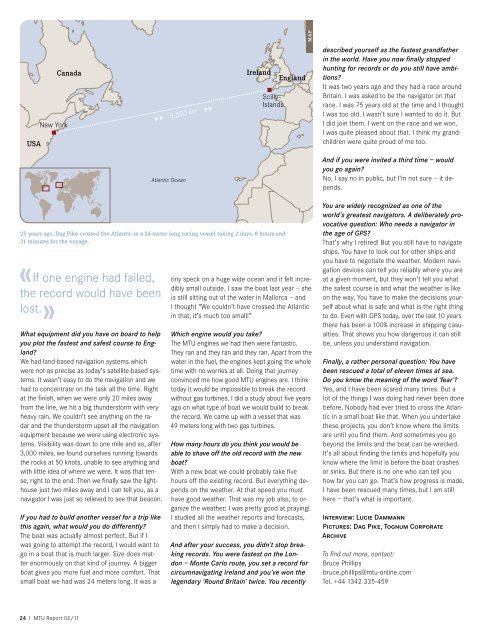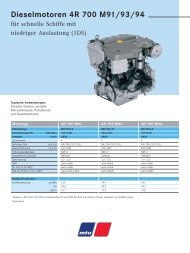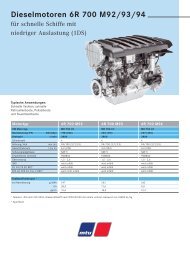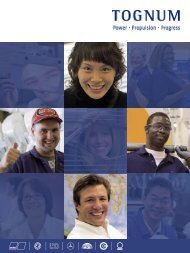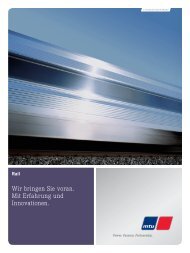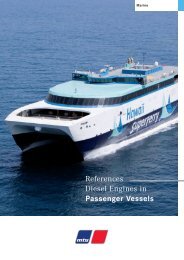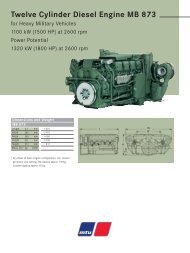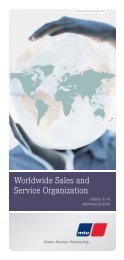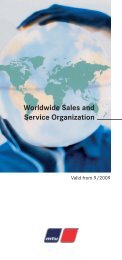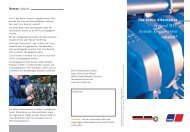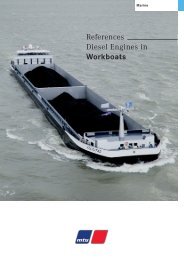Create successful ePaper yourself
Turn your PDF publications into a flip-book with our unique Google optimized e-Paper software.
USA<br />
New York<br />
Canada<br />
25 years ago, Dag Pike crossed the Atlantic in a 24-meter long racing vessel taking 2 days, 8 hours and<br />
31 minutes for the voyage.<br />
What equipment did you have on board to help<br />
you plot the fastest and safest course to England?<br />
We had land-based navigation systems which<br />
were not as precise as today’s satellite-based systems.<br />
It wasn’t easy to do the navigation and we<br />
had to concentrate on the task all the time. Right<br />
at the finish, when we were only 20 miles away<br />
from the line, we hit a big thunderstorm with very<br />
heavy rain. We couldn’t see anything on the radar<br />
and the thunderstorm upset all the navigation<br />
equipment because we were using electronic systems.<br />
Visibility was down to one mile and so, after<br />
3,000 miles, we found ourselves running towards<br />
the rocks at 50 knots, unable to see anything and<br />
with little idea <strong>of</strong> where we were. It was that tense,<br />
right to the end. Then we finally saw the lighthouse<br />
just two miles away and I can tell you, as a<br />
navigator I was just so relieved to see that beacon.<br />
If you had to build another vessel for a trip like<br />
this again, what would you do differently?<br />
The boat was actually almost perfect. But if I<br />
was going to attempt the record, I would want to<br />
go in a boat that is much larger. Size does matter<br />
enormously on that kind <strong>of</strong> journey. A bigger<br />
boat gives you more fuel and more comfort. That<br />
small boat we had was 24 meters long. It was a<br />
24 I <strong>MTU</strong> Report 02/11<br />
<strong>MTU</strong> Brown <strong>MTU</strong> Brown<br />
0-17-28-62 80% der Farbe 60% 40% 20%<br />
CMYK CMYK CMYK CMYK CMYK<br />
<strong>MTU</strong> Blue <strong>MTU</strong> Blue<br />
60% 40% 20%<br />
50-25-0-10 80% der Farbe<br />
CMYK CMYK CMYK<br />
CMYK CMYK<br />
«If one engine had failed,<br />
the record would have been<br />
lost.»<br />
�� 5,500 km ��<br />
Atlantic Ocean<br />
Ireland<br />
Scilly-<br />
Islands<br />
England<br />
tiny speck on a huge wide ocean and it felt incredibly<br />
small outside. I saw the boat last year – she<br />
is still sitting out <strong>of</strong> the water in Mallorca – and<br />
I thought “We couldn’t have crossed the Atlantic<br />
in that, it’s much too small!”<br />
Which engine would you take?<br />
The <strong>MTU</strong> engines we had then were fantastic.<br />
They ran and they ran and they ran. Apart from the<br />
water in the fuel, the engines kept going the whole<br />
time with no worries at all. Doing that journey<br />
convinced me how good <strong>MTU</strong> engines are. I think<br />
today it would be impossible to break the record<br />
without gas turbines. I did a study about five years<br />
ago on what type <strong>of</strong> boat we would build to break<br />
the record. We came up with a vessel that was<br />
49 meters long with two gas turbines.<br />
How many hours do you think you would be<br />
able to shave <strong>of</strong>f the old record with the new<br />
boat?<br />
With a new boat we could probably take five<br />
hours <strong>of</strong>f the existing record. But everything depends<br />
on the weather. At that speed you must<br />
have good weather. That was my job also, to organize<br />
the weather; I was pretty good at praying!<br />
I studied all the weather reports and forecasts,<br />
and then I simply had to make a decision.<br />
And after your success, you didn’t stop breaking<br />
records. You were fastest on the London<br />
– Monte Carlo route, you set a record for<br />
circumnavigating Ireland and you’ve won the<br />
legendary ‘Round Britain’ twice. You recently<br />
MAP<br />
described yourself as the fastest grandfather<br />
in the world. Have you now finally stopped<br />
hunting for records or do you still have ambitions?<br />
It was two years ago and they had a race around<br />
Britain. I was asked to be the navigator on that<br />
race. I was 75 years old at the time and I thought<br />
I was too old. I wasn’t sure I wanted to do it. But<br />
I did join them. I went on the race and we won.<br />
I was quite pleased about that. I think my grandchildren<br />
were quite proud <strong>of</strong> me too.<br />
And if you were invited a third time – would<br />
you go again?<br />
No. I say no in public, but I’m not sure – it depends.<br />
You are widely recognized as one <strong>of</strong> the<br />
world’s greatest navigators. A deliberately provocative<br />
question: Who needs a navigator in<br />
the age <strong>of</strong> GPS?<br />
That’s why I retired! But you still have to navigate<br />
ships. You have to look out for other ships and<br />
you have to negotiate the weather. Modern navigation<br />
devices can tell you reliably where you are<br />
at a given moment, but they won’t tell you what<br />
the safest course is and what the weather is like<br />
on the way. You have to make the decisions yourself<br />
about what is safe and what is the right thing<br />
to do. Even with GPS today, over the last 10 years<br />
there has been a 100% increase in shipping casualties.<br />
That shows you how dangerous it can still<br />
be, unless you understand navigation.<br />
Finally, a rather personal question: You have<br />
been rescued a total <strong>of</strong> eleven times at sea.<br />
Do you know the meaning <strong>of</strong> the word ‘fear’?<br />
Yes, and I have been scared many times. But a<br />
lot <strong>of</strong> the things I was doing had never been done<br />
before. Nobody had ever tried to cross the Atlantic<br />
in a small boat like that. When you undertake<br />
these projects, you don’t know where the limits<br />
are until you find them. And sometimes you go<br />
beyond the limits and the boat can be wrecked.<br />
It’s all about finding the limits and hopefully you<br />
know where the limit is before the boat crashes<br />
or sinks. But there is no one who can tell you<br />
how far you can go. That’s how progress is made.<br />
I have been rescued many times, but I am still<br />
here – that’s what is important.<br />
Interview: Lucie Dammann<br />
Pictures: Dag Pike, Tognum Corporate<br />
Archive<br />
To find out more, contact:<br />
Bruce Phillips<br />
bruce.phillips@mtu-online.com<br />
Tel. +44 1342 335-459


